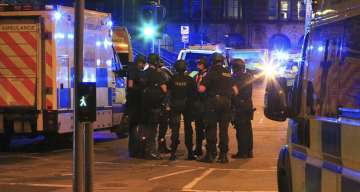British Home Secretary Amber Rudd today said that the bomber who carried out the suicide attack in Manchester city that killed 22 people may not have acted alone.
“It was a devastating occasion, it was more sophisticated than some of the attacks we’ve seen before, and it seems likely - possible - that he wasn’t doing this on his own,” Rudd said.
Libyan-origin Salman Abedi blew himself up at end of an Ariana Grande concert at the Manchester Arena on Monday night, killing 22 people and injuring 64 others.
Following the attack, the UK’s terror threat level was raised to “critical”, indicating the security services believe more attacks may be imminent.
According to Rudd, up to 3,800 troops will be deployed on the streets around Britain.
Last night, after chairing a meeting of the emergency response committee COBRA, British Prime Minister Theresa May had said that soldiers would be placed in key public locations to support armed police in protecting the public. These include Buckingham Palace, Downing Street, embassies and the Palace of Westminster.
Military personnel may also be seen at other events over the coming weeks, such as concerts and football matches, working under the command of police officers, May said.
Assistant Commissioner Mark Rowley, the UK’s most senior anti-terrorism officer with Scotland Yard, said: “We still have some critical lines of enquiry that we’re urgently chasing down. But that leaves a degree of uncertainty which has led the Joint Terrorism Analysis Centre to independently judge that the threat level needs to be raised to critical, meaning a further attack may be imminent”.
“The public would expect the police at this moment to be doing extraordinary things, everything possible to protect them. The first thing we do is stretch our police resources. We have mobilisation plans, we cancel leave, we stretch shifts. We can double the number of officers on the streets, both armed and unarmed,” Rowley said.
The first time the threat level was raised to critical in the UK was in 2006 during a major operation to stop a plot to blow up transatlantic airliners with liquid bombs.
Then in 2007, security chiefs raised it once more as they hunted for the men who had tried to bomb a London nightclub, before going on to attack Glasgow Airport.
The Islamic State (ISIS) terror network has claimed responsibility for Monday night’s attack by Abedi.
(With PTI inputs)
Latest World News

